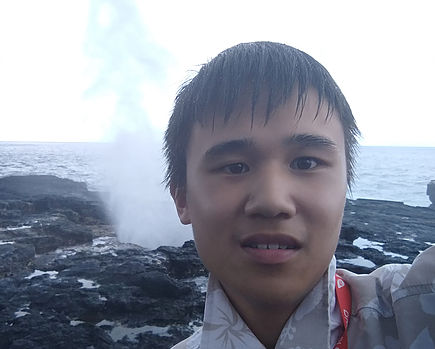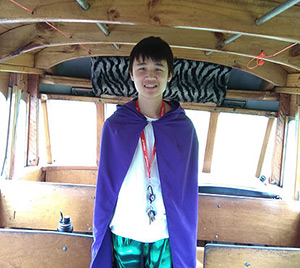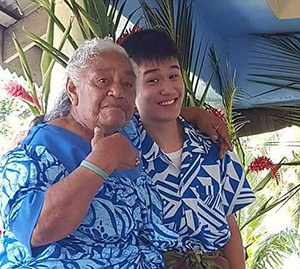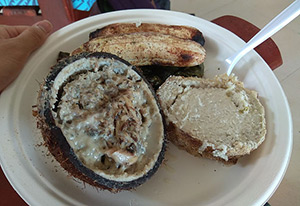Fa’aumu Elsea
June 11th, 2018 | SIT
SIT Samoa: Social and Environmental Change in Oceania, Gilman Scholar
Pacific islands have a reputation as being extravagant vacation spots, but living there for an extended period of time reveals a beauty beyond ordinary Western imaginations. Fa’aumu Elsea enrolled for 15 weeks to study in Sāmoa and experience its unique community-based culture.
“I chose SIT Samoa for its emphasis on experiential learning, and because I wanted to gain some experience in field work. I also had a personal interest in Sāmoa and wanted to learn more about the culture and language. I was delighted to find out there was even a study abroad program in Sāmoa—truly one-of-a-kind in the South Pacific.”
At the UW, Fa’aumu is a Medical Anthropology and Sociology double major. They swapped their winter and spring quarters for a semester in Sāmoa with the School for International Training (SIT) (one of the UW Study Abroad partner programs) to study Social and Environmental Change in Oceania. To help pay for expenses, Fa’aumu applied for and received a SIT scholarship and the Benjamin A. Gilman International Scholarship.
With scholarships under their belt, Fa’aumu immersed themself in Pacific island culture. The program traveled to diverse locations to bring the academic subject matter to life, including Hawai’i, Sāmoa, and American Sāmoa. During these excursions, SIT provided housing of all different kinds.

“Accommodations ranged anywhere from local village homestays to the occasional weekend resort. Most of the time, however, our group stayed at the University of the South Pacific campus hostels—which are no different from communal dorm clusters at the UW. We met students from different Pacific island nations and (contrary to popular advice) even befriended several stray dogs.”
The journey began with a week-long orientation at the University of Hawai’i, a location ideal for the class to begin discussions on topics such as Pacific Communities in Transition (the movement of Pacific communities from traditional towards globalized societies) and Climate Change & Resilience in Oceania (the ways Pacific island communities and stakeholders respond to climate change). At the end of the week, Fa’aumu and their classmates boarded a plane to Apia, Sāmoa. They continued to study those subjects as well as Samoan language and Research Methods & Ethics, all which prepared them to execute an original Independent Study Project.
“There is no ‘typical’ day in the SIT Samoa program. Excursions and visits took place anywhere in the archipelago. During the final four weeks of the program, everyone conducted an Independent Study Project on a topic and location of their choosing. I chose to conduct my Independent Study Project in American Sāmoa because of opportunities to discuss social justice topics with the local community.”

In addition to an immersive academic experience, little moments while living Sāmoan life stuck out to Fa’aumu as significant stories. One such story took place on a bus to the village of Alafua (just outside Apia) as they transported their groceries. The bus was crowded with college students who Fa’aumu knew from previous trips. They noted that older students sat towards the rear. One boy made room for Fa’aumu to sit and offered to hold their groceries, so they accepted and thanked him. During the bus ride, the boy motioned that he would like some of Fa’aumu’s soda. The girls surrounding them would shake their heads and tell them to decline the request. Fa’aumu also shook their head and everybody laughed.
“Although I felt I was getting ahold of the way local Sāmoans arrange themselves in a bus, this interaction was about the way Sāmoan friends interact with each other. The act of offering a seat, in this case, was a way of introducing me to the group. When the boy asked for my soda, he was really trying to befriend me. He and his friends were not afraid to show their character; everyone clearly knew each other but behaved differently towards me. This ride reminded me so much about how the Sāmoan language is metaphorical. The group did not directly ask if I wanted to be a friend. The group members did so by way of showing me how they carried out ordinary interactions.”
Fa’aumu felt a tremendous sense of community during their travels. They recognized that relationships and religion are central to the Samoan culture. During their time in Fasito’o-uta (about an hour outside of Apia), Fa’aumu was able to experience family life within a homestay.
“My homestay in Fasito’o-uta helped me learn all there is to know about living in Sāmoa. I stayed with a family of four at a house on the main street. During the day, relatives came in and out of the house frequently. The boundaries between households are convoluted, both literally (there are no fences) and figuratively (the extended family are simply considered family). Everyone pitches in and helps in any way. Through interactions with my host family, I learned exactly what is meant by ‘family is everything.’ I also picked up a variety of unexplainable, non-verbal cues as I grew closer to the family.”
Religion also plays an essential role in Sāmoan livelihood. Sāmoans value respect and reciprocity, which was evident to Fa’aumu in their prayers. They both revere God and include God as a member of the family—someone they can always depend on for help.
“Around sunset, an elder would cross Faleolo Way to ring the curfew bell. During this time, my family gathered, sang a song, gave God blessings and performed one long prayer. With what little Sāmoan I had learned, I noticed the structure of a prayer was similar to a lauga (speech). It acknowledges the family, the village, and Samoa. Much of the prayer gives thanks for events that impact the family in any way.”
Though Fa’aumu certainly learned a lot about Sāmoan culture through family values, the homestay was not always an easy situation.
“Being part of my host family has been the most difficult and humbling part of my semester thus far. My host family takes care of small children and I am usually not one to work well with children. But as I learned about the roles of members in a family, I came to embrace my role as a caretaker to my host brothers (along with the help of two fellow teenagers).”

The importance of relationships was also pronounced during meal times. Fa’aumu was invited to help with food preparation in anumu (an underground collection of super-heated rocks used for cooking). Men husked coconuts while women peeled unripened bananas. Though there was an apparent division of labor, all people were working while united under one goal.
“The food is a product of relationships among the hands that work the umu. Like the family, the group was aware of their interconnectedness among each other. The group work at the umu is one way relational accountability is emphasized because no one is going to let each other fail. I enjoyed learning about what goes into the umu. The environment, God and the community are all regarded by Sāmoans as family.”

Though their study abroad pursuits are not over, Fa’aumu has learned a tremendous amount both academically and culturally. Taking the time to live with the Sāmoan community and experience their way of life truly defined the difference between a simple vacation and an immersive study abroad experience.
“A good friend on the trip once told me peoples’ personalities often correspond to nearby bodies of water. If the waters are calm, people are friendly. If the waters are rough—well, you get the idea. In Sāmoa, the waters are calm, and people want to be friends. It goes to show there are much more reasons to love and appreciate a place than meets the eye.”
Written by Madison Gallagher
Photos courtesy of Fa'aumu Elsea
Reprinted with permission from University of Washington Office of Global Affairs
